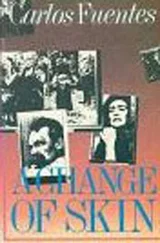Jealousy kills love but not desire. This is the true punishment of passion betrayed. We despise the woman who broke the pact of love, but continue to desire her because her betrayal was evidence of her own passions. For jealousy to exist, the romantic relationship cannot end with indifference. The lover who abandons us must have the intelligence to insult us, debase us, assault us savagely so that we cannot forget her in resignation. So that we continue desiring her with jealousy, the perverted name we give to our erotic will.
Norman Mailer describes jealousy as a kind of museum full of pictures that the jealous man guards like a curator. To me, jealousy is like a life within the life we normally live. We can take a plane, return to our home city or one we do not know, call our friends and sometimes even forgive our enemies, but during all that time we are living another life, a life that obeys its own laws, that is separate from us even though it lives within us. That life inside our life is jealousy and it manifests itself physically. As the popular Mexican expression goes, nos hace circo la barriga, that is, it makes the stomach churn. A ferocious, bitter wave of bile that churns, rising and falling from the heart to the stomach and then from the stomach to a crippled, useless member that has suddenly been rendered a casualty of war. It makes you want to hang a medal around the poor penis. And after that, a funeral wreath. The crescendo of jealousy, however, neither celebrates nor stops for very long in any one part of the body. Like a poisonous liquid it courses through the body, not to destroy it but to plague it, squeezing tightly so that its most vile juices rise up to the head and affix themselves, like the hard, green scales of a snake, upon our tongue, our breath, our gaze. .
Jealousy makes us feel expelled from life, as if a loved one has died. Of course, when someone dies, we are allowed to exhibit the pain we feel. The pain of jealousy, however, must be concealed, dark and venomous, to avoid pity and ridicule. Exposed jealousy exposes us to the laughter of others. It is a journey back to adolescence, that blighted age when everything we do in the public sphere — walking, talking, looking — can be the object of someone else’s laughter. Both adolescence and jealousy separate us from life and prevent us from truly living.
“Have you read Kafka?” Milan Kundera asks me.
“Of course,” I reply. “To me, he is the essential writer of the twentieth century.”
Kundera smiles scornfully. “Have you read him in German?” he asks.
“No.”
“Then you have not read Kafka.”
Milan Kundera’s reflection on the untranslatable excellence of Kafka’s German does concede, at least in the case of the Spanish, one notable and worthy exception. The translation of Miguel Sáenz (Franz Kafka, Obras completas, Galaxia Gutenberg/Círculo de Lectores, Barcelona) is so very splendid that I sincerely doubt it would affect the irony of my friend Milan.
Kafka, the fundamental writer of the terrible twentieth century. Without Kafka, we could never understand the age we live in.
With moral and intellectual courage, Pietro Citati dares to think the unthinkable: that Kafka’s Josef K, of The Trial, is in fact guilty. That the apparent victim is possibly the guilty party.
Citati does not ignore Kafka’s various biographical layers: his relationship with his father, with Judaism, with the bourgeois professional life of Prague, his native city, the “little mother with claws.” After all is said and done, Citati tells us, Gregor Samsa would still rather be a sacrificed son than a free insect. He is an Isaac whose sacrifice, in The Metamorphosis, is not aborted by the Angel of God.
In his novel El daño ( The Damage ), the Mexican writer Sealtiel Alatriste offers a Kafka intimately connected to his mother, who sacrifices her own musical vocation in favor of her son’s literary genius.
And while Citati’s suggestion that the victim is guilty may seem scandalous at first, it nevertheless becomes luminously rigorous when he forces us to realize that power is virtual and that the victim of power exerts a force that otherwise would not exist.
We dress the emperor with no clothes.
We turn the ghost of power into the body of power.
All Kafka does is demonstrate the imbalance that exists between real power and the myth of power. And from here emerges the question: if power can make its own fiction reality, how can culture make its own reality convincing? Is subjectivity enough?
According to the Chilean philosopher Martin Hopenhayn, Kafka’s Diaries give his novels a subjective resonance that they would otherwise lack. There is no interiority in Kafka’s fiction. The Diaries, on the other hand, are the interior appeal to external passions. This is a vexing complementarity, as when the protagonists of the novels are heroes of reason. They suffer because they have been marginalized by reason. But they do not understand the “reasons” that marginalize them. Their “rationalism,” then, consists of losing themselves in an undifferentiated system and perceiving themselves as outsiders in the formalization processes of social interaction.
From here we can appreciate Kafka’s extraordinary construction and staging of the relationship between the individual and power — without doubt the most lucid, the most disturbing, and the most contemporary that has been written in the last hundred years.
According to Hopenhayn, the individual in Kafka’s world is a parasite who wishes he wasn’t but who, to his own chagrin, exposes the world of parasites that the system requires in order to exercise its power. The Kafkaesque “hero” only wishes to be embraced by power. But by subjecting himself to it, he unwittingly scratches at its mask. He reveals the arbitrary basis upon which power rests thanks to his clumsiness, not his intelligence. In Kafka, the emperor’s clothes are not removed by some critic or other of the emperor. The nakedness of power is brought to light through the inability of its subjects to decipher the strategies employed by the power system.
Kafka’s literary power boils down to one fact: his fiction describes a kind of power that makes its own fiction convincing. In both The Trial and The Castle, Kafka describes a void in the power structure that presents itself as something perfectly filled. We are aware of the lie that has usurped the power system, but even knowing that it is a lie, we are shocked as we witness the spectacle that carries out the charade. In Kafka, power exercises its might through pure virtuality. The authorities in The Castle always remain intact because they are only potentialities. As a consequence, the victim of power (e.g., Josef K, Land Surveyor K) imagines a power system that is proportional to the force of its absence. The rule of the rule of power is the uncertainty felt with respect to its enforcement.
When he died in 1924, Franz Kafka had no way of knowing, with the precision of the chronological historian, that ten years later his infernal visions of power would become a historical reality of power. But as they arrived by night — without reason, without excuses — to arrest their victims, the gestapo and the NKVD were arresting Franz Kafka. Is there anything more Kafkaesque than when Comrade Commissar I. V. Kovalev arrived at Minsk in 1937 to assume his duties, only to find himself in an office that had been emptied totally because his predecessor and all his underlings had been executed as traitors to Stalin?
Kovalev, as fate would have it, took the desk of the next victim: himself. Mikhail Koltsov, the Izvestia correspondent during the Spanish Civil War, declared in an equally Kafkaesque manner that if Stalin declared him, Koltsov, to be a traitor, he would believe it, even if it were untrue. And in fact Koltsov was imprisoned and executed as part of the quota of arrests that the secret police were forced to make in order to satisfy their dictator, even though they knew that they themselves, the executioners, would be the next victims of Stalinist paranoia.
Читать дальше












